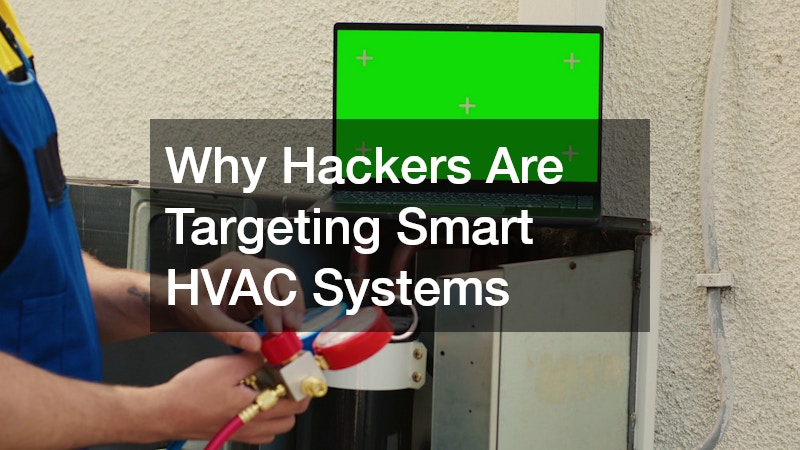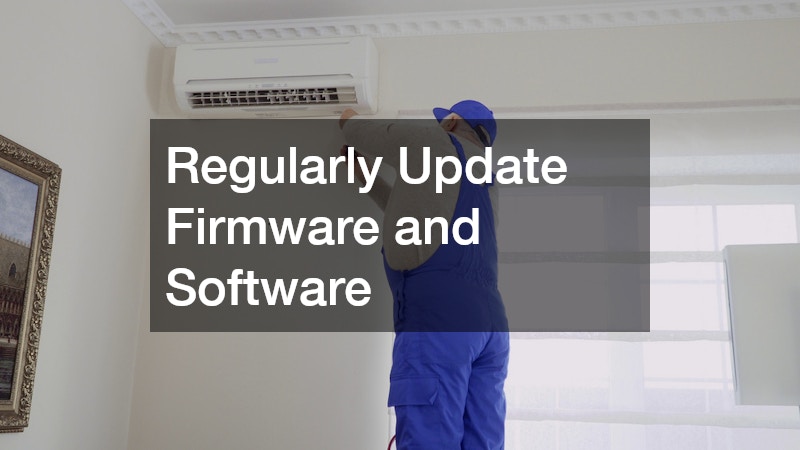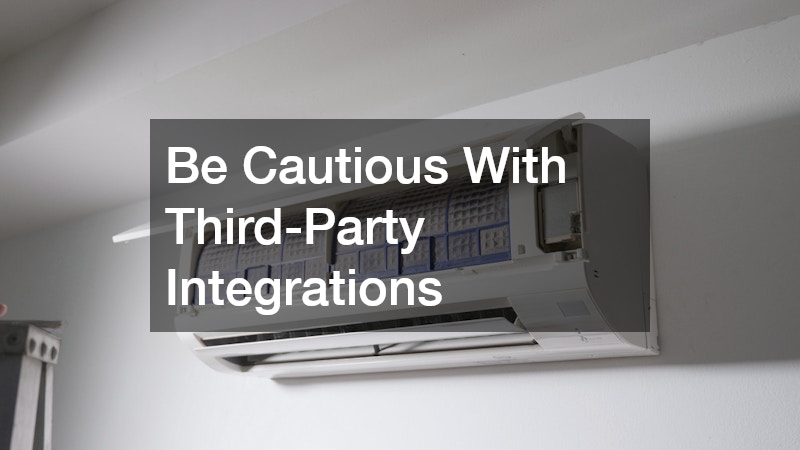Smart HVAC systems have become increasingly popular for their convenience and energy-saving capabilities. However, these systems are also vulnerable to cyber attacks. As hackers target smart HVAC systems, it’s essential for homeowners and HVAC technicians to take proactive steps to secure these devices by following helpful HVAC technician tips.
Why Hackers Are Targeting Smart HVAC Systems

Smart HVAC systems are appealing targets for hackers due to their connectivity to home networks. By gaining access to these systems, hackers can potentially control the temperature of a home, gather personal information, or launch more significant attacks on the network. It’s crucial for an air conditioning company to be aware of these risks and take appropriate security measures.
One of the common reasons why hackers target smart HVAC systems is the lack of strong security measures in place. Many homeowners fail to change default usernames and passwords, making it easy for hackers to gain unauthorized access. By understanding why hackers are targeting these systems, HVAC professionals can educate their clients on the importance of security.
Moreover, smart HVAC systems often store sensitive data, such as homeowner’s schedules and preferences. This makes them valuable targets for cybercriminals looking to steal personal information for malicious purposes. As the HVAC industry continues to adopt smart technologies, the need for robust security measures becomes increasingly urgent.
Understand the Connectivity of Your HVAC System
When installing or servicing smart HVAC systems, HVAC technicians must understand how these devices connect to home networks. By understanding the connectivity of these systems, technicians can identify potential vulnerabilities and take steps to secure them effectively. Additionally, technicians should stay informed about the latest cybersecurity threats and best practices.
HVAC Service providers must also prioritize ongoing training for their technicians to ensure they are well-equipped to address cybersecurity risks. By understanding the connectivity of smart HVAC systems, technicians can deliver better service to their clients and protect them from potential cyber attacks.
By incorporating cybersecurity training into their HVAC service offerings and following these HVAC technician tips, providers can differentiate themselves in the market and build trust with their customers. Understanding the connectivity of smart HVAC systems is essential for technicians looking to secure these devices and protect their clients’ homes.
Change Default Usernames and Passwords Immediately
One of the most critical steps in securing a smart HVAC system is to change default usernames and passwords immediately. Default credentials are often easy for hackers to guess or obtain, making it essential to create unique, complex passwords for each device. An HVAC equipment company should educate homeowners on the importance of changing default credentials to prevent unauthorized access.
hvac equipment companies should also emphasize the need for strong passwords in their product documentation and customer support materials. By changing default usernames and passwords, homeowners can significantly reduce the risk of their smart HVAC systems being compromised. HVAC technicians must make changing credentials a standard practice during installation and service visits.
Additionally, HVAC professionals should recommend using password managers to generate and store secure passwords for smart HVAC systems. By changing default credentials immediately and following these HVAC technician tips, homeowners can enhance the security of their devices and protect their homes from cyber threats. HVAC technicians play a crucial role in ensuring that their clients follow best practices for securing smart HVAC systems.
Use Two-Factor Authentication (2FA) Wherever Possible

In addition to changing default credentials, HVAC technicians should encourage homeowners to enable two-factor authentication (2FA) wherever possible. 2FA adds an extra layer of security by requiring users to provide a second form of verification, such as a code sent to their mobile device when logging in. By implementing 2FA, homeowners can significantly enhance the security of their smart HVAC systems.
hvac replacement companies should also integrate 2FA into their products and services to help customers protect their devices from unauthorized access. HVAC technicians should guide homeowners through the process of setting up 2FA on their smart HVAC systems and provide ongoing support to ensure its effective use. By using 2FA, homeowners can defend against common attack methods, such as password phishing and brute force attacks.
Moreover, 2FA can provide peace of mind to homeowners, knowing that their smart HVAC systems are protected by an additional layer of security. HVAC technicians should emphasize the importance of using 2FA to their clients and offer guidance on implementing this security feature effectively. By promoting the use of 2FA and following these HVAC technician tips, HVAC professionals can safeguard smart HVAC systems from cyber threats and build trust with their customers.
Secure Your Home Wi-Fi Network First
Before securing smart HVAC systems, homeowners must ensure that their home Wi-Fi network is adequately protected. A secure Wi-Fi network is the first line of defense against cyber attacks, as many smart devices rely on it for connectivity. HVAC system repair specialists should advise homeowners to secure their Wi-Fi networks by changing default passwords and enabling encryption.
hvac technician tips recommend using a strong password for the Wi-Fi network and regularly updating the router’s firmware to patch security vulnerabilities. HVAC professionals should educate homeowners on the importance of securing their home Wi-Fi network to protect all connected devices, including smart HVAC systems. By securing the network first, homeowners can create a more robust defense against cyber threats.
Additionally, homeowners should restrict access to their Wi-Fi network by enabling network segmentation and guest networks for smart devices. HVAC technicians can assist homeowners in setting up these features and provide guidance on maintaining a secure home network. By securing the home Wi-Fi network first, homeowners can minimize the risk of unauthorized access to their smart HVAC systems and other connected devices.
Create a Separate Network for Smart Devices
To further enhance security, homeowners should consider creating a separate network specifically for smart devices, including smart HVAC systems. By isolating these devices on a dedicated network, homeowners can prevent potential breaches from spreading to other connected devices. HVAC installation professionals should recommend setting up a separate VLAN for smart devices to enhance network security.
hvac technician tips suggest segmenting the home network to minimize the risk of unauthorized access to sensitive information or control of smart devices. By creating a separate network for smart devices, homeowners can contain potential security threats and monitor the behavior of these devices more effectively. HVAC professionals play a crucial role in advising homeowners on network segmentation best practices for securing smart HVAC systems.
Moreover, by creating a separate network for smart devices, homeowners can better control access permissions and restrict communication between devices. HVAC technicians should guide homeowners through the process of setting up a separate network and provide ongoing support for maintaining its security. By segregating smart devices on a separate network, homeowners can enhance the overall security of their smart HVAC systems and protect their homes from cyber attacks.
Regularly Update Firmware and Software

Maintaining up-to-date firmware and software is essential for securing smart HVAC systems from vulnerabilities. HVAC repair companies should emphasize the importance of regularly updating firmware and software to patch security flaws and improve device performance. By staying current with updates, homeowners can ensure their smart HVAC systems are protected from the latest cyber threats.
hvac technician tips recommend enabling automatic updates for firmware and software to streamline the process and ensure timely security patches. HVAC professionals should educate homeowners on the significance of firmware updates for maintaining the security and functionality of their smart HVAC systems. By regularly updating firmware and software, homeowners can mitigate the risk of exploitation by hackers looking for outdated devices.
Additionally, an HVAC repair company should monitor manufacturers’ release notes for security updates and notify homeowners of any critical patches that need immediate attention. By proactively updating firmware and software, homeowners can strengthen the security of their smart HVAC systems and reduce the likelihood of successful cyber attacks. HVAC professionals should factor firmware and software updates into their maintenance services and emphasize the importance of staying current with security releases.
Disable Unused Features and Services
Smart HVAC systems often come with a range of features and services that may pose security risks if left enabled. HVAC technicians should advise homeowners to disable any unused features or services on their smart HVAC systems to reduce the attack surface for hackers. By deactivating unnecessary functions, homeowners can enhance the security and privacy of their devices.
ac services companies recommend reviewing the settings of smart HVAC systems regularly to identify and disable unused features that could compromise security. HVAC professionals should guide homeowners through the process of customizing device settings to minimize potential vulnerabilities. By disabling unused features and services, homeowners can proactively protect their smart HVAC systems from unauthorized access and data breaches.
Moreover, by disabling unnecessary functions, homeowners can optimize the performance of their smart HVAC systems and ensure they operate securely. HVAC technicians should conduct regular audits of smart HVAC system configurations to identify and address any security concerns. By actively managing feature settings with these HVAC technician tips, homeowners can enhance the overall security posture of their smart HVAC systems and minimize the risk of cyber attacks.
Monitor Device Behavior for Anomalies
Monitoring the behavior of smart HVAC systems for anomalies is essential for detecting and responding to potential security threats. HVAC companies should educate homeowners on the importance of monitoring device behavior and provide guidance on how to spot unusual activity. By keeping a close eye on device behavior, homeowners can identify and mitigate security incidents promptly.
hvac technician tips recommend setting up alerts and notifications for suspicious activity on smart HVAC systems to proactively address potential threats. An HVAC company should assist homeowners in configuring monitoring tools and establishing response protocols for security incidents. By monitoring device behavior for anomalies, homeowners can take swift action to protect their smart HVAC systems and prevent unauthorized access.
Additionally, homeowners should regularly review logs and reports from their smart HVAC systems to identify patterns or trends that may indicate a security issue. HVAC technicians can help homeowners interpret these data sources and implement additional security measures based on their findings. By actively monitoring device behavior, homeowners can stay vigilant against cyber threats and safeguard their smart HVAC systems effectively.
Use a Firewall or Network Security Tool
Deploying a firewall or network security tool is another critical step in protecting smart HVAC systems from cyber attacks. HVAC repairs specialists should recommend installing a firewall to filter incoming and outgoing network traffic and block malicious connections. By implementing a firewall, homeowners can create a barrier between their devices and potential threats.
HVAC technician tips suggest configuring the firewall to restrict access to ports and protocols that smart HVAC systems do not use, minimizing the risk of unauthorized access. HVAC professionals should guide homeowners through setting up a firewall and provide recommendations for reputable security tools. By using a firewall or network security tool, homeowners can fortify their smart HVAC systems against external threats and achieve greater peace of mind.
Furthermore, homeowners should regularly update their firewall and security tool configurations to address new threats and vulnerabilities. HVAC technicians can assist homeowners in fine-tuning firewall settings and optimizing security tool performance for maximum protection. By leveraging a firewall or network security tool, homeowners can create a robust defense against cyber attacks and maintain the integrity of their smart HVAC systems.
Be Cautious With Third-Party Integrations

While third-party integrations can enhance the functionality of smart HVAC systems, they also pose potential security risks. HVAC technician tips recommend vetting third-party integrations carefully to ensure they meet security standards and do not compromise the system’s integrity. By exercising caution with third-party integrations, homeowners can avoid inadvertently exposing their smart HVAC systems to vulnerabilities.
When selecting integrations—such as smart assistants, energy monitoring apps, or automation platforms—homeowners should prioritize established, reputable brands known for robust cybersecurity practices. Well-known companies are more likely to provide regular security updates and maintain transparency about data usage. In contrast, unfamiliar or poorly reviewed apps may lack basic protections, increasing the risk of exploitation or data leaks.
Additionally, homeowners should take time to review app permissions and access controls during the setup process. Many third-party apps request broad access to device controls or personal information, which isn’t always necessary for their core function. Limiting permissions to only what’s essential and periodically auditing connected apps can significantly reduce security risks over time.
Securing smart HVAC systems from hackers requires a proactive approach and adherence to best practices. By understanding the risks of cyber attacks and implementing robust security measures, homeowners can protect their smart HVAC systems and safeguard their homes from potential breaches. HVAC technicians play a crucial role in educating clients on security practices and ensuring that smart HVAC systems are installed and maintained securely. By following the tips outlined in this article, homeowners can mitigate the risk of cyber threats and enjoy the full benefits of their smart HVAC systems.



